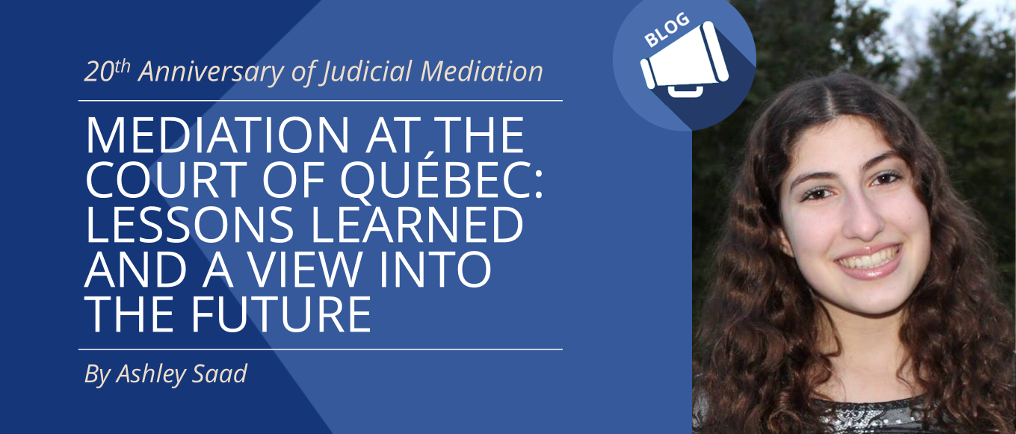Mediation at the Court of Québec: Lessons Learned and a View into the Future

The panel entitled “Mediation at the Court of Québec: Lessons Learned and a View into the Future” examined the evolution of judicial mediation and the Court of Québec’s contribution to Quebec’s leadership role in the field.
As affirmed by Professor Jean-François Roberge of the Université de Sherbrooke, the identity of judicial mediation is in a constant state of evolution. In its first generation, the identity of judicial mediation was subject to the classic debate of whether the mediator judge’s role should converge or diverge from his or her traditional judicial role. The National Judicial Institute chose the diverging approach, and thus instructed judges to act like mediators and focus on solution facilitation rather than on risk management1. The second generation of judicial mediation was ushered in by the overhaul of Quebec’s Code of Civil Procedure in 2016. Henceforth, all judicial processes, whether they are processes before the courts or private dispute prevention and resolution processes, must be guided by the same general principles of law: proportionality, good faith, cooperation and, more broadly, the interest of justice. Therefore, the identity of judicial mediation is now characterized by the equivalence of judicial processes with a particular focus on the experience of the litigants2.
The Honourable Sylvain Coutlée of the Court of Québec described judicial mediation as the fastest way to reaching a consensus. In its efforts to promote judicial mediation, the Court of Québec introduced a program called “médiation sur place”. If the parties failed to ask for a settlement conference in the case protocol, the judge can give them a second chance to do so. The judge will give the parties the opportunity to attend a mediation session with a trained lawyer from the Young Bar Association of Montreal. This program has a success rate of 60% to 65%, which is high considering the fact that the parties have had no prior preparation. Universities are also promoting the practice of mediation in Quebec. The Université de Sherbrooke now has a mediation class offered in the third year of its Bachelor of Law program and the Université de Montréal has a mediation clinic that prepares students to participate in the “International Commercial Mediation Competition” run by the International Center for ADR.
The Honourable Robert Proulx, Associate Chief Judge of the Court of Québec, explained how mediation was first a taboo in the Youth Division of the Court of Québec because of the sensitive nature of the cases involving children. In contrast to other cases, the same judge handles the case in the Youth Division until he or she is convinced that the child is safe. Thus, mediation may at first seem contradictory to the judicial procedure. An additional step is therefore required, as the judge has to select the cases that are eligible for private dispute prevention and resolution processes. Judicial mediation is now being practiced in areas of law where it had traditionally been excluded from, as it is increasing seen as an effective conflict resolution technique.
__________________________
1JF Roberge. « La conférence de règlement à l’amiable: les enjeux du raisonnement judiciaire et du raisonnement de résolution de problème. » (2005) 3-1 RPRD 25.
2JF Roberge. “Sense of Access to Justice as a Framework for Civil Procedure Justice Reform: An Empirical Assessment of Judicial Settlement Conferences in Quebec (Canada).” (2016) 17:2 Cardozo Journal of Conflict Resolution 323-361.
PANEL: Mediation at the Court of Appeal : Lessons Learned and a View into the Future
Chair: The Hon. Nicole Duval Hesler, Chief Justice, Court of Appeal of Québec
Speakers: The Hon. Pierre Michaud, Retired Chief Justice, Court of Appeal of Québec; The Hon. Marie-France Bich, Court of Appeal of Québec; The Hon. Julie Dutil, Court of Appeal of Québec
This report was issued by the Canadian Institute for the Administration of Justice on January 15, 2019, following an International Seminar celebrating the 20th Anniversary of Judicial Mediation. The Honourable Nicole Duval Hesler, Chief Justice of Quebec, was Honorary Chair for the event which was held in Montreal on November 22, 2018.
To share your comments, please contact CIAJ by email at: ciaj@ciaj-icaj.ca.

